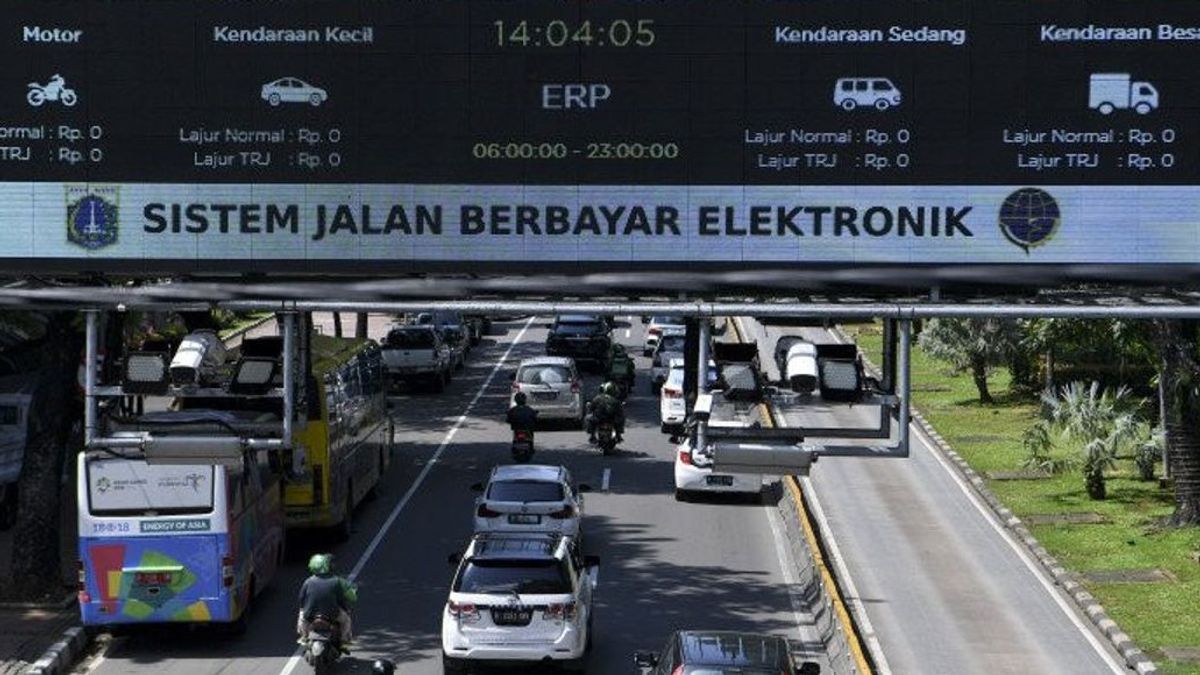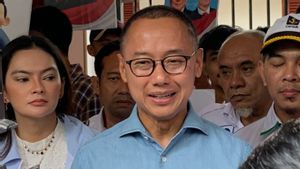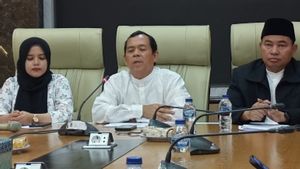The discourse on implementing an electronic paid road system or Electronic Road Pricing (ERP) in the capital city of Jakarta has surfaced again. Public Policy Observer Agus Pambagio hopes that the DKI Jakarta Provincial Government must be more serious so that this policy discourse does not stall again.
Because, according to him, the discourse on implementing paid roads has actually existed since the days of the Governor of DKI Jakarta, Fauzi Bowo, around 2009. In fact, at that time, Foke, Fauzi Bowo's nickname, planned to implement it in 2010.
Unfortunately until 2011, regulations regarding the application of paid roads have not been issued. The implementation of the paid path was delayed.
"Not traveling, suddenly the company has our boss, so it has been abandoned until now. Yes, now, if you want to continue, please continue," Agus told VOI, Wednesday (11/1).
However, Agus reminded that the electronic paid road policy cannot stand alone. There must be other policies that accompany so that the objectives of implementing these policies can be achieved. The public can finally limit the use of private vehicles.
"Examples of mutual cooperation policies such as the imposition of expensive tariffs in parking areas of buildings located around paid roads. Also, presenting parking areas at certain points bordering capital buffer cities, but at very low parking rates," said Agus.
In addition, what is much more important is to encourage connected public transportation. Currently, according to Agus, the connection between public transportation is much better but the smile-last smile hasn't been confirmed yet.
"In a sense, not all areas, we are out of the housing, public transportation is available. Some residents have to walk long before they meet public transportation. Likewise when they arrive. It is not necessarily down from public transportation directly to their destination," he said.
If these tariff policies have not gone well, don't expect the implementation of paid roads to run effectively.
"My advice to the Governor of DKI immediately connect all public transportation in Jakarta while waiting for the basis of the legislation to be completed. Otherwise, it will be very difficult," he added.
Transportation observer from the Bandung Institute of Technology (ITB), Sony Sulaksono Wibowo also considers the policy of implementing paid roads in Jakarta to be very appropriate. Complementing other policies that have been running before, such as odd-even.
During the two days of odd-even implementation in June 2022 alone, according to the Transportation Service, the speed of motorized vehicles, especially cars, can reach 30 km per hour during peak hours.
"Moreover, if the paid road system is implemented. It should be more effective. Just try it on several roads first. All vehicles without exception must comply, including government vehicles and online motorcycle taxi transportation," Sony told VOI, Wednesday (11/1).
In Singapore, a paid road system has been implemented since 1998. Only a few main roads are implemented and only at certain times. The result, according to the US Department of Transportation, was able to reduce congestion by 24 percent at that time.
Singaporeans slowly but surely switch to using buses and trains to save travel costs.
In Jakarta, Indonesia, the paid road system will be applied at provincial road points where the ratio of vehicles is always congested. There are 25 roads that are the reference based on the Draft Regional Regulation (Raperda) for Electronic Traffic Control (PLLE).
Among other things, Jalan Pintu Besar Selatan, Jalan Gajah Mada, Jalan Hayam Wuruk, Jalan Majapahit, Jalan Medan Merdeka Barat, Jalan M Husni Thamrin, Jalan Jend Sudirman, Jalan Sisingamangaraja, Jalan Panglima Polim, and Jalan Fatmawati (Jalan Ketimun 1-Simpang Jalan TB Simatupang)
Then, on Jalan Suryopranoto, Jalan Balikpapan, Jalan Kyai Caringin, Jalan Tomang Raya, Jalan Jend S Parman (Jalan Tomang Raya-Simpang Jalan Gatot Subroto), Jalan Gatot Subroto, Jalan MT Haryono, Jalan DI Panjaitan, and Jalan Jenderal A Yani (East Bekasi Raya Intersection - Perintis Kemerdekaan Intersection).
Also on Jalan Pramuka, Jalan Salemba Raya, Jalan Kramat Raya, Jalan Pasar Senen, Jalan Gunung Sahari, and Jalan HR Rasuna Said.
The mechanism for imposing paid road rates is as done by Singapore by adjusting the type of vehicle. The DKI Provincial Government proposes an electronic paid road rate of around Rp. 5,000-Rp. 19,000 according to the category and type of vehicle. Valid every day from 05.00-22.00 WIB.
"But this still needs to be discussed at the central level," said the Acting Governor of DKI Jakarta, Heru Budi Hartono, as quoted by Antara, Wednesday (11/1).
So far, the DKI Provincial Government has made a number of traffic engineering efforts to unravel congestion in the capital city, as well as to release Jakarta's image as a traffic jam.
Starting from the implementation of 3 in 1 in 2003 on main roads, such as Jalan Sisingamangaraja, Jalan Jenderal Sudirman, Jalan MH Thamrin, Jalan Medan Merdeka Barat, Jalan Majapahit, Jalan Gajah Mada, Jalan Pintu Besar Selatan, Jalan Pintu Besar Utara, Jalan Hayam Wuruk, and parts of Jalan Gatot Subroto.
All vehicles are required to carry at least 3 passengers when passing lane 3 in 1. Starting from Monday-Friday at 07.00-10.00 WIB and 16.00-19.00 WIB.
Then, in 2016, the Governor of DKI Jakarta, Basuki Tjahaja Purnama (Ahok), removed the regulation and replaced it with an odd-even policy. Valid Monday-Friday from 07.00-10.00 WIB and 16.00-20.00 WIB on Jalan Medan Merdeka Barat, Jalan MH Thamrin, Jalan Jenderal Sudirman, and Jalan Sisingamangaraja.
Also, part of Jalan Jenderal Gatot Subroto between the intersection of Jalan Gatot Subroto starting from the Youth Gate to the intersection of Jalan HR Rasuna Said on public roads.
In 2018, Governor Anies Baswedan adjusted the rules by adding a list of odd-even roads and increasing the time of restrictions.
Now, can an electronic paid road system be the next solution to overcome congestion? According to Sony Sulaksono Wibowo, The most important thing is also to be consistent. So that people will inevitably have to choose public transportation over private vehicles. Not only traffic engineering, it is also necessary to continue campaign for public transportation so that people are moved.
The English, Chinese, Japanese, Arabic, and French versions are automatically generated by the AI. So there may still be inaccuracies in translating, please always see Indonesian as our main language. (system supported by DigitalSiber.id)








